Featured Author Event: Cristina Alger (NYC)
July 9, 2018
 G.P. Putnam’s Sons author Cristina Alger will be presenting her thrilling new novel, THE BANKER’S WIFE, at the 86th Street and Lexington Avenue Barnes & Noble in Manhattan on Tuesday, July 10. The event will feature Christina in conversation with Lee Childs, author of twenty-two New York Times bestselling JACK REACHER thrillers.
G.P. Putnam’s Sons author Cristina Alger will be presenting her thrilling new novel, THE BANKER’S WIFE, at the 86th Street and Lexington Avenue Barnes & Noble in Manhattan on Tuesday, July 10. The event will feature Christina in conversation with Lee Childs, author of twenty-two New York Times bestselling JACK REACHER thrillers.
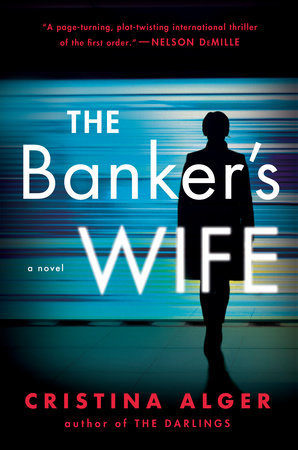 Meanwhile, Marina Tourneau, an ambitious society journalist, is on the cusp of joining the very same high society she writes about. With her engagement to Grant Ellis, Marina decides to trade in her pen and paper for the upper echelons of New York’s social scene, but not before digging into one last story—the final investigation her mentor was working on before his sudden and untimely death. While looking into Swiss United, Marina uncovers information that implicates some of the most powerful figures in the financial world, including a few who are too close to home. This story can also be the answer to Annabel’s desperate search for answers, but only if Marina chooses to publish it.
Cristina Alger is also the author of THE DARLINGS and THIS WAS NOT THE PLAN. She graduated from Harvard College and NYU Law School. Before becoming a writer, she worked as a financial analyst and a corporate attorney. Cristina lives in New York with her husband and children.
Meanwhile, Marina Tourneau, an ambitious society journalist, is on the cusp of joining the very same high society she writes about. With her engagement to Grant Ellis, Marina decides to trade in her pen and paper for the upper echelons of New York’s social scene, but not before digging into one last story—the final investigation her mentor was working on before his sudden and untimely death. While looking into Swiss United, Marina uncovers information that implicates some of the most powerful figures in the financial world, including a few who are too close to home. This story can also be the answer to Annabel’s desperate search for answers, but only if Marina chooses to publish it.
Cristina Alger is also the author of THE DARLINGS and THIS WAS NOT THE PLAN. She graduated from Harvard College and NYU Law School. Before becoming a writer, she worked as a financial analyst and a corporate attorney. Cristina lives in New York with her husband and children. Bestselling Author Lisa Scottoline Comes to Putnam
May 30, 2018
 Lisa Scottoline is bringing her beloved and bestselling brand to G.P. Putnam’s Sons with a six-book deal, including three domestic thrillers as well as her first foray into historical fiction with ETERNAL, an epic trilogy set in Fascist Italy during World War II. The deal was announced by the Associated Press and has been picked up in more than sixty outlets all across the country. Ivan Held negotiated the deal with Robert Gottlieb, Chairman at Trident Media Group, and the first domestic thriller, tentatively titled SOMEONE KNOWS, will publish in Spring 2019. Mark Tavani will edit.
Lisa Scottoline is bringing her beloved and bestselling brand to G.P. Putnam’s Sons with a six-book deal, including three domestic thrillers as well as her first foray into historical fiction with ETERNAL, an epic trilogy set in Fascist Italy during World War II. The deal was announced by the Associated Press and has been picked up in more than sixty outlets all across the country. Ivan Held negotiated the deal with Robert Gottlieb, Chairman at Trident Media Group, and the first domestic thriller, tentatively titled SOMEONE KNOWS, will publish in Spring 2019. Mark Tavani will edit.
 Lisa Scottoline, Photo by April Narby[/caption]
The three domestic thrillers acquired by Putnam will follow on the heels of recent bestsellers like After Anna and One Perfect Lie. They will be riveting and emotionally resonant stand-alone novels of suspense centered on strong female characters up against impossible odds. ETERNAL is Scottoline’s first work of historical fiction, and the first book in the trilogy is set in Fascist Italy during the reign of Benito Mussolini. Spanning ten years during World War II as Fascism rises and the Italian Holocaust begins, the novel tells the story of the beautiful and fiercely independent Elisabetta “Betta” D’Orfeo, who finds herself caught in a love triangle with her two closest friends, one a rising star in the Fascist party, the other a reserved Jewish mathematics prodigy. Family secrets and betrayals change Betta’s circumstances until she is forced to make a devastating choice in a world gone mad with bloodlust and war. Reminiscent of novels like The Nightingale, Pachinko, and of Elena Ferrante’s the Neapolitan trilogy, ETERNAL is an engrossing, sweeping story that explores themes of love, family, liberty, and justice in wartime history.
Scottoline has been researching the Italian Holocaust since her undergraduate days in a year-long seminar at the University of Pennsylvania, which she took with author Philip Roth, who she cites as a reason for writing ETERNAL. As reported by AP, Scottoline said, “’We did a close, almost line-by-line, analysis of the books he chose for us, evidence of Roth’s famous saying that he became an author because he ‘liked sentences’…I myself became an author because of him, his seminar and his books, especially his survey of the harrowing first-person accounts of the Holocaust…I knew that someday I would write about the Holocaust in Italy and have been researching and studying it since then. I owe it to Philip Roth,’ she added. “I will mourn him always.’”
About Lisa Scottoline
After a successful career in corporate law, Scottoline released her first legal thriller, Everywhere that Mary Went, in 1994. Her debut was an immediate bestseller and was nominated for an Edgar Award, the most prestigious award given in crime fiction. Her second novel, Final Appeal, won the Edgar Award for Best Paperback Original in 1995. She has gone on to write 31 novels to date, all of which have appeared on the New York Times, Wall Street Journal, USA Today, and Publishers Weekly bestseller lists. Her novels consistently receive rave reviews, including from the Washington Post who called her most recent domestic thriller After Anna a “deliciously distracting thriller [with] a stunner of a story line.” And Janet Maslin of The New York Times praised her wildly popular Rosato & Associates series as “punchy, wisecracking thrillers.” Scottoline also writes humorous nonfiction and a weekly column in the Philadelphia Inquirer, called “Chick Wit,” with her daughter Francesca Serritella.
Lisa Scottoline, Photo by April Narby[/caption]
The three domestic thrillers acquired by Putnam will follow on the heels of recent bestsellers like After Anna and One Perfect Lie. They will be riveting and emotionally resonant stand-alone novels of suspense centered on strong female characters up against impossible odds. ETERNAL is Scottoline’s first work of historical fiction, and the first book in the trilogy is set in Fascist Italy during the reign of Benito Mussolini. Spanning ten years during World War II as Fascism rises and the Italian Holocaust begins, the novel tells the story of the beautiful and fiercely independent Elisabetta “Betta” D’Orfeo, who finds herself caught in a love triangle with her two closest friends, one a rising star in the Fascist party, the other a reserved Jewish mathematics prodigy. Family secrets and betrayals change Betta’s circumstances until she is forced to make a devastating choice in a world gone mad with bloodlust and war. Reminiscent of novels like The Nightingale, Pachinko, and of Elena Ferrante’s the Neapolitan trilogy, ETERNAL is an engrossing, sweeping story that explores themes of love, family, liberty, and justice in wartime history.
Scottoline has been researching the Italian Holocaust since her undergraduate days in a year-long seminar at the University of Pennsylvania, which she took with author Philip Roth, who she cites as a reason for writing ETERNAL. As reported by AP, Scottoline said, “’We did a close, almost line-by-line, analysis of the books he chose for us, evidence of Roth’s famous saying that he became an author because he ‘liked sentences’…I myself became an author because of him, his seminar and his books, especially his survey of the harrowing first-person accounts of the Holocaust…I knew that someday I would write about the Holocaust in Italy and have been researching and studying it since then. I owe it to Philip Roth,’ she added. “I will mourn him always.’”
About Lisa Scottoline
After a successful career in corporate law, Scottoline released her first legal thriller, Everywhere that Mary Went, in 1994. Her debut was an immediate bestseller and was nominated for an Edgar Award, the most prestigious award given in crime fiction. Her second novel, Final Appeal, won the Edgar Award for Best Paperback Original in 1995. She has gone on to write 31 novels to date, all of which have appeared on the New York Times, Wall Street Journal, USA Today, and Publishers Weekly bestseller lists. Her novels consistently receive rave reviews, including from the Washington Post who called her most recent domestic thriller After Anna a “deliciously distracting thriller [with] a stunner of a story line.” And Janet Maslin of The New York Times praised her wildly popular Rosato & Associates series as “punchy, wisecracking thrillers.” Scottoline also writes humorous nonfiction and a weekly column in the Philadelphia Inquirer, called “Chick Wit,” with her daughter Francesca Serritella. Celebrating the Life and Legacy of Sue Grafton
May 4, 2018
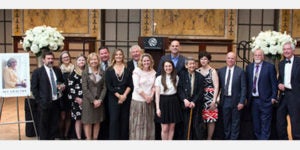 Friends, family and colleagues of #1 New York Times bestselling author Sue Grafton celebrated her life and legacy on Tuesday, April 24, throughout a special memorial at the New York Public Library. The publishing industry was well represented with authors, media, and publishing colleagues from Penguin Random House and Holt, alongside many of Sue’s family and friends. G.P. Putnam’s Sons President Ivan Held welcomed the group and noted that “we’ve all worked with writers we admire, writers we are in awe of, writers who are entertaining or menschy or funny. Sue was all that – but Sue: we also LOVED her … everyone who worked with her loved her.”
Friends, family and colleagues of #1 New York Times bestselling author Sue Grafton celebrated her life and legacy on Tuesday, April 24, throughout a special memorial at the New York Public Library. The publishing industry was well represented with authors, media, and publishing colleagues from Penguin Random House and Holt, alongside many of Sue’s family and friends. G.P. Putnam’s Sons President Ivan Held welcomed the group and noted that “we’ve all worked with writers we admire, writers we are in awe of, writers who are entertaining or menschy or funny. Sue was all that – but Sue: we also LOVED her … everyone who worked with her loved her.”
 Marian Wood[/caption]
Ivan introduced Sue’s longtime editor Marian Wood, who told the story of discovering Sue after receiving the first 60-pages of A IS FOR ALIBI. After devouring them overnight and initially receiving pushback from her publisher at the time, Marian and those of her colleagues who believed that Sue was something special pushed the Alphabet Series to mega-success over the course of thirty-five years, now with untold millions of copies sold around the world in twenty-six languages.
Sue’s literary agent Molly Friedrich, together since B IS FOR BURGLAR, gave an emotional speech about her last visit with Sue just a few months before she passed. At the time, Sue was undergoing chemotherapy, but she still baked Molly a birthday cake from scratch. “I had assumed my birthday cake would be made by Liz Gastiger, their long-term chef and friend. But no, Sue had made my cake herself: a perfect lemon genoise with buttercream frosting,” Friedrich said. “There’s something so deeply moving about this beloved writer, not an ounce over ninety pounds, baking me a sublime birthday cake.”
After Lucy Carson of the Friedrich Agency read a remembrance from Judy Kaye, the voice of Kinsey Millhone in the audiobook editions of the Alphabet, author and journalist Sarah Weinman shared what she loved about Sue’s novels: “Trailblazers don’t announce themselves upon arrival…The two qualities I appreciated most about Grafton were her loyalty, and her restlessness. She stayed true to Kinsey and the series conceit for her entire career, yes, but did not allow herself to stagnate, writing the same book over and over again…Sue Grafton died too soon, but she remained in control till the end. She had not begun writing the final book in the series, which was to be published in August 2019 as Z is for Zero. That leaves us with Grafton’s last published words, as always both ‘respectfully submitted’ and sharply delivered by Kinsey: ‘I’m not saying justice is for sale, but if you have enough money, you can sometimes enjoy the benefits of a short-term lease.’”
[caption id="attachment_112200" align="alignleft" width="300"]
Marian Wood[/caption]
Ivan introduced Sue’s longtime editor Marian Wood, who told the story of discovering Sue after receiving the first 60-pages of A IS FOR ALIBI. After devouring them overnight and initially receiving pushback from her publisher at the time, Marian and those of her colleagues who believed that Sue was something special pushed the Alphabet Series to mega-success over the course of thirty-five years, now with untold millions of copies sold around the world in twenty-six languages.
Sue’s literary agent Molly Friedrich, together since B IS FOR BURGLAR, gave an emotional speech about her last visit with Sue just a few months before she passed. At the time, Sue was undergoing chemotherapy, but she still baked Molly a birthday cake from scratch. “I had assumed my birthday cake would be made by Liz Gastiger, their long-term chef and friend. But no, Sue had made my cake herself: a perfect lemon genoise with buttercream frosting,” Friedrich said. “There’s something so deeply moving about this beloved writer, not an ounce over ninety pounds, baking me a sublime birthday cake.”
After Lucy Carson of the Friedrich Agency read a remembrance from Judy Kaye, the voice of Kinsey Millhone in the audiobook editions of the Alphabet, author and journalist Sarah Weinman shared what she loved about Sue’s novels: “Trailblazers don’t announce themselves upon arrival…The two qualities I appreciated most about Grafton were her loyalty, and her restlessness. She stayed true to Kinsey and the series conceit for her entire career, yes, but did not allow herself to stagnate, writing the same book over and over again…Sue Grafton died too soon, but she remained in control till the end. She had not begun writing the final book in the series, which was to be published in August 2019 as Z is for Zero. That leaves us with Grafton’s last published words, as always both ‘respectfully submitted’ and sharply delivered by Kinsey: ‘I’m not saying justice is for sale, but if you have enough money, you can sometimes enjoy the benefits of a short-term lease.’”
[caption id="attachment_112200" align="alignleft" width="300"] Harlan Coben[/caption]
Author Michael Connelly told heartfelt stories, then author J.R. Ward reflected on her friendship with Sue. They first met when Sue agreed to read her manuscript: “She had this bizarre thing where she’d read 50 pages of anyone’s work. The only condition was that you had to be willing to take her criticism. Years later, I would ask her why the hell she would do that, and she said, ‘Because the shitshows are even better than the good stuff!’ [When we first met to discuss my manuscript], she gave me more information in that hour than I had had about writing in the ten years that I was trying to get published.” Bird finished her speech by recalling the last time she saw Sue, at a holiday party late last year. “I thought I had more time,” she said. “And that’s the problem with life—you can’t see how few pages are left.”
An emotional remembrance of Sue was delivered by bestselling author Harlan Coben, a fan of her books before they became close friends. “We all have people in our life who make every room better,” he began. “Every place that they happen to be in is just a little better because they were there. Sue was certainly one of those people … She was funny, she was biting, she was honest, irreverent, intelligent, warm, inquisitive, insightful. She was cutting, and most of all … she was generous.” Towards the end of his speech, Coben revealed that his “alphabet letters” tie included all of the letters except Z—a perfect tribute to Sue and her legacy, which he gave to Sue’s husband after the ceremony.
[caption id="attachment_112203" align="alignright" width="300"]
Harlan Coben[/caption]
Author Michael Connelly told heartfelt stories, then author J.R. Ward reflected on her friendship with Sue. They first met when Sue agreed to read her manuscript: “She had this bizarre thing where she’d read 50 pages of anyone’s work. The only condition was that you had to be willing to take her criticism. Years later, I would ask her why the hell she would do that, and she said, ‘Because the shitshows are even better than the good stuff!’ [When we first met to discuss my manuscript], she gave me more information in that hour than I had had about writing in the ten years that I was trying to get published.” Bird finished her speech by recalling the last time she saw Sue, at a holiday party late last year. “I thought I had more time,” she said. “And that’s the problem with life—you can’t see how few pages are left.”
An emotional remembrance of Sue was delivered by bestselling author Harlan Coben, a fan of her books before they became close friends. “We all have people in our life who make every room better,” he began. “Every place that they happen to be in is just a little better because they were there. Sue was certainly one of those people … She was funny, she was biting, she was honest, irreverent, intelligent, warm, inquisitive, insightful. She was cutting, and most of all … she was generous.” Towards the end of his speech, Coben revealed that his “alphabet letters” tie included all of the letters except Z—a perfect tribute to Sue and her legacy, which he gave to Sue’s husband after the ceremony.
[caption id="attachment_112203" align="alignright" width="300"] Steve Humphrey[/caption]
Finally, Sue’s daughter Jamie Clark and her husband Steve Humphrey shared recollections of what Sue was like as a mother and wife. “I’m going to tell you a little about what my mother taught me,” Clark began. “My mother taught me about persistence, just by the way she lived her life. She wasn’t just an author, she was a writer. She wrote every single day. Rain or shine … My mother was a force of nature—not the destructive kind like a tornado or hurricane, but the gentle creative kind, like the spring sunshine that melts the snow and coaxes the flowers to bloom … For as long as there have been mothers and daughters, their relationships have been complicated. But not ours. Somehow, I lucked out when I stood in line for a mom. She was one of the best people I’ve ever known.”
Steve Humphrey[/caption]
Finally, Sue’s daughter Jamie Clark and her husband Steve Humphrey shared recollections of what Sue was like as a mother and wife. “I’m going to tell you a little about what my mother taught me,” Clark began. “My mother taught me about persistence, just by the way she lived her life. She wasn’t just an author, she was a writer. She wrote every single day. Rain or shine … My mother was a force of nature—not the destructive kind like a tornado or hurricane, but the gentle creative kind, like the spring sunshine that melts the snow and coaxes the flowers to bloom … For as long as there have been mothers and daughters, their relationships have been complicated. But not ours. Somehow, I lucked out when I stood in line for a mom. She was one of the best people I’ve ever known.”
 Humphrey began his speech by recalling how he and Sue first met, when they lived in the same apartment building. At the time, Sue was “a single mom raising two children … [She] and I had cats, and we would watch them play together in the courtyard between our apartments, her on the ground floor, me on the second, and make inane comments about how cute they were… That was the beginning of a forty-three year love affair. She adored me. I adored her. I consider myself to be infinitely blessed and fortunate. How many people get to find the love of their life at 23? And those of you who only knew her through her work, or only knew her professionally, really missed out. As brilliant as she was as a writer, and as disciplined as she was in her work, she was a much, much, much better wife, mother, friend and human being.”
Following these heartfelt, funny, warm and sassy remembrances of Sue, the group toasted Sue’s life, work and friendship with some of Sue (and Kinsey’s) favorites: glasses of buttery chardonnay and triangles of peanut butter and pickle sandwiches.
Humphrey began his speech by recalling how he and Sue first met, when they lived in the same apartment building. At the time, Sue was “a single mom raising two children … [She] and I had cats, and we would watch them play together in the courtyard between our apartments, her on the ground floor, me on the second, and make inane comments about how cute they were… That was the beginning of a forty-three year love affair. She adored me. I adored her. I consider myself to be infinitely blessed and fortunate. How many people get to find the love of their life at 23? And those of you who only knew her through her work, or only knew her professionally, really missed out. As brilliant as she was as a writer, and as disciplined as she was in her work, she was a much, much, much better wife, mother, friend and human being.”
Following these heartfelt, funny, warm and sassy remembrances of Sue, the group toasted Sue’s life, work and friendship with some of Sue (and Kinsey’s) favorites: glasses of buttery chardonnay and triangles of peanut butter and pickle sandwiches. “She’s ba-AACK!” ‘Cathy’ Creator’s Debut Essay Collection Acquired by Putnam
April 25, 2018
 As the creator of the ‘Cathy’ comic strip, Cathy Guisewite found her way into the hearts of readers over 40 years ago, and has been there ever since. Her deeply funny and relatable look at the life of a frazzled career woman became a cultural touchstone for women everywhere—the strips have been compiled into more than twenty books, and earned Guisewite the National Cartoonists Society Reuben Award in 1992 and an Emmy Award for Outstanding Animated Program for the Cathy TV special in 1987.
As the creator of the ‘Cathy’ comic strip, Cathy Guisewite found her way into the hearts of readers over 40 years ago, and has been there ever since. Her deeply funny and relatable look at the life of a frazzled career woman became a cultural touchstone for women everywhere—the strips have been compiled into more than twenty books, and earned Guisewite the National Cartoonists Society Reuben Award in 1992 and an Emmy Award for Outstanding Animated Program for the Cathy TV special in 1987.

 She recently returned to the spotlight with a widely shared New York Times op-ed about the Women’s March, and now, she’s back with her signature self-deprecating wit and warmth in FIFTY THINGS THAT AREN’T MY FAULT: Essays from the Grown-Up Years, which Putnam acquired and will publish in the Spring of 2019. In this collection, Guisewite turns her uniquely wry and funny gaze to her own day-to-day life, with topics ranging from the mundane—teaching her parents to use TiVo, organizing four decades of photos, attempting to meditate—to the more profound—her struggle to find a purpose post-retirement and helping her parents downsize their lives—and her personal definitions of feminism. Humorous, warm, and poignant, FIFTY THINGS is ideal reading for mothers, daughters, and everyone who is caught somewhere in between, and on the threshold of “What Happens Next.”
In The Washington Post, Guisewite revealed the inspiration behind this collection: “People ‘talk about the ‘sandwich generation,’” the cartoonist says. “It much more feels to me like the ‘panini generation,’ where we’re squished between them – facing the heat of responsibility from both sides while ‘trying to be a loving guide,’ yet still making time to meet some life-goal deadlines and take ‘all those selfies that no longer resemble myself.’”
She recently returned to the spotlight with a widely shared New York Times op-ed about the Women’s March, and now, she’s back with her signature self-deprecating wit and warmth in FIFTY THINGS THAT AREN’T MY FAULT: Essays from the Grown-Up Years, which Putnam acquired and will publish in the Spring of 2019. In this collection, Guisewite turns her uniquely wry and funny gaze to her own day-to-day life, with topics ranging from the mundane—teaching her parents to use TiVo, organizing four decades of photos, attempting to meditate—to the more profound—her struggle to find a purpose post-retirement and helping her parents downsize their lives—and her personal definitions of feminism. Humorous, warm, and poignant, FIFTY THINGS is ideal reading for mothers, daughters, and everyone who is caught somewhere in between, and on the threshold of “What Happens Next.”
In The Washington Post, Guisewite revealed the inspiration behind this collection: “People ‘talk about the ‘sandwich generation,’” the cartoonist says. “It much more feels to me like the ‘panini generation,’ where we’re squished between them – facing the heat of responsibility from both sides while ‘trying to be a loving guide,’ yet still making time to meet some life-goal deadlines and take ‘all those selfies that no longer resemble myself.’” Our 5 Nominees for 2018 Edgar Awards
January 19, 2018
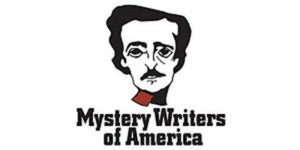 Mystery Writers of America (MWA) has announced its nominees for the 2018 Edgar Allan Poe Awards, honoring the best in mystery fiction, nonfiction, and television published or produced in 2017. Five books published by Penguin Random House imprints earned nominations in the following categories:
Mystery Writers of America (MWA) has announced its nominees for the 2018 Edgar Allan Poe Awards, honoring the best in mystery fiction, nonfiction, and television published or produced in 2017. Five books published by Penguin Random House imprints earned nominations in the following categories: 
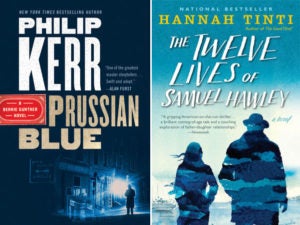 Best Novel
PRUSSIAN BLUE by Philip Kerr (Marian Wood Books/G.P.Putnam’s Sons)
THE TWELVE LIVES OF SAMUEL HAWLEY by Hannah Tinti (The Dial Press)
Best Novel
PRUSSIAN BLUE by Philip Kerr (Marian Wood Books/G.P.Putnam’s Sons)
THE TWELVE LIVES OF SAMUEL HAWLEY by Hannah Tinti (The Dial Press)
 Best First Novel
LOLA by Melissa Scrivner Love (Crown)
IDAHO by Emily Ruskovich (Random House)
Best First Novel
LOLA by Melissa Scrivner Love (Crown)
IDAHO by Emily Ruskovich (Random House)
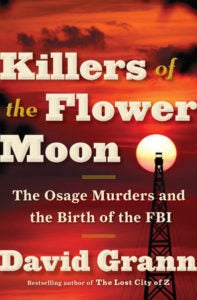 Best Fact Crime
KILLERS OF THE FLOWER MOON: The Osage Murders and the Birth of the FBI by David Grann (Doubleday)
View the complete list of nominees here.
This year’s Edgar Awards will be presented to the winners at MWA’s 72nd Gala Banquet on April 26 in Manhattan.
Best Fact Crime
KILLERS OF THE FLOWER MOON: The Osage Murders and the Birth of the FBI by David Grann (Doubleday)
View the complete list of nominees here.
This year’s Edgar Awards will be presented to the winners at MWA’s 72nd Gala Banquet on April 26 in Manhattan. THE MARSH KING’S DAUGHTER and THE KELLOGGS Named Michigan Notable Books
January 17, 2018
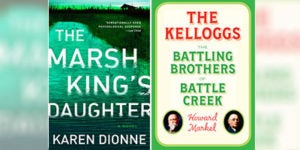 The Library of Michigan has announced its 2018 Michigan Notable Books honorees as part of its annual recognition program. This year’s 20 books were chosen by Michigan librarians from a list of nearly 300 titles published in 2017. Two of the books being honored are published by Penguin Random House imprints:
The Library of Michigan has announced its 2018 Michigan Notable Books honorees as part of its annual recognition program. This year’s 20 books were chosen by Michigan librarians from a list of nearly 300 titles published in 2017. Two of the books being honored are published by Penguin Random House imprints:
 THE MARSH KING’S DAUGHTER by Karen Dionne (G.P. Putman’s Sons)
THE KELLOGGS: The Battling Brothers of Battle Creek by Howard Markel (Pantheon Books)
THE MARSH KING’S DAUGHTER by Karen Dionne (G.P. Putman’s Sons)
THE KELLOGGS: The Battling Brothers of Battle Creek by Howard Markel (Pantheon Books)
 Congratulations to Ms. Dionne and Mr. Markel as well as their editors and publishers.
View the complete list of 2018 Michigan Notable Books here.
The Night for Notable celebration, hosted by the Library of Michigan Foundation and featuring author Richard Ford as keynote speaker, will take place in Detroit on April 7.
Congratulations to Ms. Dionne and Mr. Markel as well as their editors and publishers.
View the complete list of 2018 Michigan Notable Books here.
The Night for Notable celebration, hosted by the Library of Michigan Foundation and featuring author Richard Ford as keynote speaker, will take place in Detroit on April 7.
Behind the Pages of THE IMMORTALISTS with Sally Kim and Chloe Benjamin
January 8, 2018
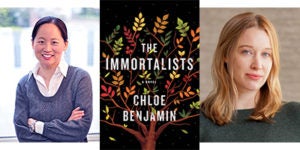 Celebrating the publication of THE IMMORTALISTS, one of the most highly anticipated books of 2018, we present a special “Behind the Pages” interview with the novel’s editor, Sally Kim, Vice President, Editorial Director, G. P. Putnam’s Sons, and author Chloe Benjamin.
Celebrating the publication of THE IMMORTALISTS, one of the most highly anticipated books of 2018, we present a special “Behind the Pages” interview with the novel’s editor, Sally Kim, Vice President, Editorial Director, G. P. Putnam’s Sons, and author Chloe Benjamin.
 Sally Kim[/caption]
I was lucky that Chloe’s agent included me on her submission list, and I remember loving the book from its pitch alone. (I think I might have even sent her an idiotic note like, “I love this book already!”) There are 101 things I love about this book, but what struck me right away is how Chloe takes such a high concept (to continue that overused term) and completely delivers on the page-turning story level, but also just slays you with her beautiful writing, line by line. I remember having to pause at times, just to fully savor a turn of phrase or a stunning moment. It’s so rare to have both strengths—both incredibly hard to accomplish—live in one novel.
How would you describe the editor/author process as this book reached its final form?
It may sound funny, but we started the editing process even before the auction! I’ll always remember that first call with Chloe, when I was trying to woo her, and we jumped right into talking about changes for certain characters, amping up a story’s thread…what if we tried this, and what about that. We clicked right away and talked for over an hour, and I knew I’d love working with her. She was smart, funny, humble – but she’d worked *hard* on this book, over many years, and was confident and firm in all the right ways: she was open, but also had a strong vision. In other words, my idea of the perfect collaborator!
What elements of THE IMMORTALISTS do you think will resonate most strongly with readers?
Another question with too many answers! But if I had to whittle it down to the one people continue to write in, comment, post about: It’s the way this book takes such large ideas—such as: Can you change your destiny? Can a story be real, just because you believe it to be true?—and gives you a way to examine them up close, with characters you live a lifetime with, without proposing to give you one final answer at the end.
Chloe Benjamin:
What was the inspiration behind THE IMMORTALISTS’ plot premise and creation of the primary storylines?
[caption id="attachment_9112" align="alignright" width="300"]
Sally Kim[/caption]
I was lucky that Chloe’s agent included me on her submission list, and I remember loving the book from its pitch alone. (I think I might have even sent her an idiotic note like, “I love this book already!”) There are 101 things I love about this book, but what struck me right away is how Chloe takes such a high concept (to continue that overused term) and completely delivers on the page-turning story level, but also just slays you with her beautiful writing, line by line. I remember having to pause at times, just to fully savor a turn of phrase or a stunning moment. It’s so rare to have both strengths—both incredibly hard to accomplish—live in one novel.
How would you describe the editor/author process as this book reached its final form?
It may sound funny, but we started the editing process even before the auction! I’ll always remember that first call with Chloe, when I was trying to woo her, and we jumped right into talking about changes for certain characters, amping up a story’s thread…what if we tried this, and what about that. We clicked right away and talked for over an hour, and I knew I’d love working with her. She was smart, funny, humble – but she’d worked *hard* on this book, over many years, and was confident and firm in all the right ways: she was open, but also had a strong vision. In other words, my idea of the perfect collaborator!
What elements of THE IMMORTALISTS do you think will resonate most strongly with readers?
Another question with too many answers! But if I had to whittle it down to the one people continue to write in, comment, post about: It’s the way this book takes such large ideas—such as: Can you change your destiny? Can a story be real, just because you believe it to be true?—and gives you a way to examine them up close, with characters you live a lifetime with, without proposing to give you one final answer at the end.
Chloe Benjamin:
What was the inspiration behind THE IMMORTALISTS’ plot premise and creation of the primary storylines?
[caption id="attachment_9112" align="alignright" width="300"] Chloe Benjamin
Chloe Benjamin(C) Nathan Jandl[/caption] I’ve always been drawn to big questions: What are the benefits and perils of knowledge? How can we live fully in the face of uncertainty? And how do we love through and despite the possibility of loss? These questions simmered in the background as I built the structure of THE IMMORTALISTS, which follows four siblings who, as children, receive prophecies about the dates that they will supposedly die. The structure of the novel–it’s told in four sections, one per each sibling, each picking up where the previous one let off–came to me very early. I also knew I wanted each sibling to be quite different, both in their life experiences and in their orientation toward the prophecy. All four required a great deal of research. How do you see readers identifying with your novel and its characters? A reader may not be a magician like Klara, or a gay man finding himself in 1980s San Francisco, like Simon–but the questions about life and loss that these characters struggle with are, I think, universal. Secretly, I hope that readers will connect with the siblings who are on the face of it quite different from them. We live in hard, fractured times, and books are rare in their ability to inspire empathy.
Sue Grafton, 1940 - 2017
January 3, 2018
 The publishing world lost a legend and friend, Sue Grafton, #1 New York Times, USA Today and Wall Street Journal– bestselling author of the ground-breaking Alphabet Mystery series featuring beloved Private Investigator Kinsey Millhone, died on Thursday, December 28 in Santa Barbara after a two-year battle with cancer of the appendiceil. She was 77.
The publishing world lost a legend and friend, Sue Grafton, #1 New York Times, USA Today and Wall Street Journal– bestselling author of the ground-breaking Alphabet Mystery series featuring beloved Private Investigator Kinsey Millhone, died on Thursday, December 28 in Santa Barbara after a two-year battle with cancer of the appendiceil. She was 77.
 Ivan Held, President of G.P. Putnam’s Sons, said, “Everyone who worked with Sue admired her, flipped for the books, and were in awe of her 25-book creation, Kinsey Milhone. But on top of that -- we also all LOVED her. With her wry, Kentucky accent she inspired a really deep and genuine love from everyone who worked with her in house.”
T
Ivan Held, President of G.P. Putnam’s Sons, said, “Everyone who worked with Sue admired her, flipped for the books, and were in awe of her 25-book creation, Kinsey Milhone. But on top of that -- we also all LOVED her. With her wry, Kentucky accent she inspired a really deep and genuine love from everyone who worked with her in house.”
T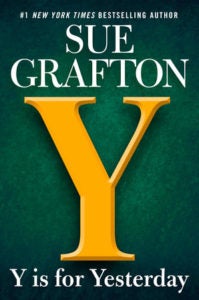 hirty-five years ago, Grafton launched one of the most acclaimed and celebrated mystery series of all time with A is for Alibi, and with it created the model of the modern female detective with Kinsey Millhone, a feisty, whip-smart woman who is not above breaking the rules to solve a case or save a life. Like her fictional alter ego, Grafton was a true original, a model for every woman who has ever said the hell with this and struck out on her own independent way.
Grafton’s books have sold untold millions and are published in twenty-eight countries and in twenty-six languages—including Estonian, Bulgarian, and Indonesian. Her most recent novel, Y IS FOR YESTERDAY, which published in August 2017, received with tremendous praise and debuted at #1 on the New York Times bestseller list.
hirty-five years ago, Grafton launched one of the most acclaimed and celebrated mystery series of all time with A is for Alibi, and with it created the model of the modern female detective with Kinsey Millhone, a feisty, whip-smart woman who is not above breaking the rules to solve a case or save a life. Like her fictional alter ego, Grafton was a true original, a model for every woman who has ever said the hell with this and struck out on her own independent way.
Grafton’s books have sold untold millions and are published in twenty-eight countries and in twenty-six languages—including Estonian, Bulgarian, and Indonesian. Her most recent novel, Y IS FOR YESTERDAY, which published in August 2017, received with tremendous praise and debuted at #1 on the New York Times bestseller list.
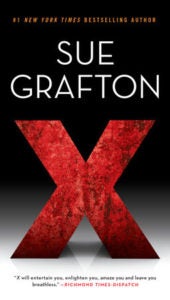 News of her passing ran in outlets throughout the country (and world) including in the New York Times, Associated Press, USA Today, Entertainment Weekly, Vanity Fair, Vulture, NPR, and CNN. The Washington Post wrote, “[Kinsey Millhone is] one of the most endearing, vivid and memorable characters in modern crime fiction … Ms. Grafton examines human character as deeply as any clues that might solve a crime. Critics noted that the stories often had an undercurrent of tender observation seldom found in the hard-boiled fiction of male writers.”
There has been an outpouring of love on social media from fans including former president Bill Clinton, who tweeted, “RIP Sue Grafton. Hillary and I loved all your novels from A is for Alibi to Y is for Yesterday. We’ll miss Kinsey and you. Godspeed.”
News of her passing ran in outlets throughout the country (and world) including in the New York Times, Associated Press, USA Today, Entertainment Weekly, Vanity Fair, Vulture, NPR, and CNN. The Washington Post wrote, “[Kinsey Millhone is] one of the most endearing, vivid and memorable characters in modern crime fiction … Ms. Grafton examines human character as deeply as any clues that might solve a crime. Critics noted that the stories often had an undercurrent of tender observation seldom found in the hard-boiled fiction of male writers.”
There has been an outpouring of love on social media from fans including former president Bill Clinton, who tweeted, “RIP Sue Grafton. Hillary and I loved all your novels from A is for Alibi to Y is for Yesterday. We’ll miss Kinsey and you. Godspeed.”
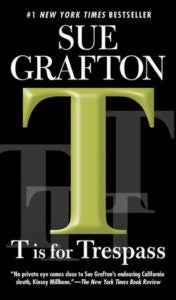 Fellow authors shared their fond remembrances of Sue including Louise Penny, who said, “Kinsey was a brilliant creation and a companion for many of us, for years. Thank you, Sue, for leading the way. And for always being so gracious to those of us who followed.” David Baldacci wrote, “To know Sue Grafton was an honor. To call her a friend was a thrill. She was a great writer, one of our absolute best in any genre, but she was an even greater person. 2018 will be far emptier without her.” And James Lee Burke, who said, “Everyone liked Sue. She had a great wit and knew how to bring the house down, without ever being grandiose. Her passing is a big loss. Sue was a real trooper, one of those who sets the standard. I think her greatest gift to others is the dignity and composure and confidence and perseverance that characterized her career. I think that's a pretty good legacy to leave behind.
[caption id="attachment_9066" align="alignleft" width="179"]
Fellow authors shared their fond remembrances of Sue including Louise Penny, who said, “Kinsey was a brilliant creation and a companion for many of us, for years. Thank you, Sue, for leading the way. And for always being so gracious to those of us who followed.” David Baldacci wrote, “To know Sue Grafton was an honor. To call her a friend was a thrill. She was a great writer, one of our absolute best in any genre, but she was an even greater person. 2018 will be far emptier without her.” And James Lee Burke, who said, “Everyone liked Sue. She had a great wit and knew how to bring the house down, without ever being grandiose. Her passing is a big loss. Sue was a real trooper, one of those who sets the standard. I think her greatest gift to others is the dignity and composure and confidence and perseverance that characterized her career. I think that's a pretty good legacy to leave behind.
[caption id="attachment_9066" align="alignleft" width="179"]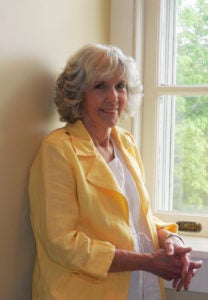 Sue Grafton
Sue Grafton(c) Steven Humphrey[/caption] Anyway, here's to you, Sue. You're the best.” More remembrances came from the likes of C.J. Box, Robert Crais, Daniel Silva, Eric Jerome Dickey, Harlan Coben, Lisa Scottoline, Ruth Ware. Sandra Brown, Sara Paretsky, Jeff Abbott, Laura Lippman, Faye Kellerman, Debbie Macomber, Alafair Burke, and Meg Gardiner, to name a few. Sue and Kinsey will be remembered as international icons (both adored a peanut butter and pickle sandwich and a timeless black wrap dress) and treasured by millions of readers across lines of gender, geography, age, race, and creed. As Grafton’s daughter, Jamie, said in a statement on the author’s Facebook Page, “the alphabet now ends at Y.” A personal remembrance from Marian Wood, Sue Grafton’s longtime editor and friend:
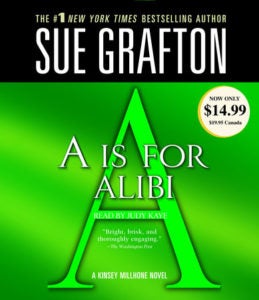 “In 1980, I got 60 pages of a manuscript. It was a snowy day and more bad weather was forecast, so I grabbed the 60 pages plus a couple of manuscripts and rode back to Brooklyn to enjoy a few snow days at home.
“I can tell you, I was stunned by those 60 pages. I wanted more. I wanted the whole book. I wanted to publish this amazing writer.
“But there was an obstacle. My publisher.
“‘I don’t get it,’ he said after reading those sixty pages. Luckily, I had already given them to the marketing director, who did get it and we became a team, and the publisher caved. That was the beginning of A Is for Alibi. You might say the rest is history as the books took off and the market grew exponentially.
“In 1980, I got 60 pages of a manuscript. It was a snowy day and more bad weather was forecast, so I grabbed the 60 pages plus a couple of manuscripts and rode back to Brooklyn to enjoy a few snow days at home.
“I can tell you, I was stunned by those 60 pages. I wanted more. I wanted the whole book. I wanted to publish this amazing writer.
“But there was an obstacle. My publisher.
“‘I don’t get it,’ he said after reading those sixty pages. Luckily, I had already given them to the marketing director, who did get it and we became a team, and the publisher caved. That was the beginning of A Is for Alibi. You might say the rest is history as the books took off and the market grew exponentially.
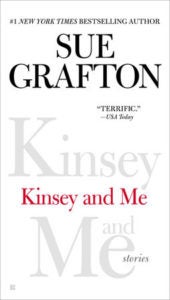 “I’m a seat-of-the pants editor. When I read something and the bomb goes off in my head, I know it’s for me, I know it’s amazing, I know with backing, we can make it fly. And so it was with the alphabet series. And sales multiplied with each new book.
“Sue Grafton was a find all right. She was also an extraordinary human being. Already forty with a ton of experience being pushed around by movie personnel, all she wanted was control over her work—no interference from pseudo-smart twenty-five year old movie mavens. Books offered her that. Let me tell you, by the time we connected, she was a tough, smart, and dedicated craftswoman and also the most generous and kindest writer you could work with. And so, for forty years, we worked and laughed and loved Kinsey. And so did the world it seemed.
“I’m a seat-of-the pants editor. When I read something and the bomb goes off in my head, I know it’s for me, I know it’s amazing, I know with backing, we can make it fly. And so it was with the alphabet series. And sales multiplied with each new book.
“Sue Grafton was a find all right. She was also an extraordinary human being. Already forty with a ton of experience being pushed around by movie personnel, all she wanted was control over her work—no interference from pseudo-smart twenty-five year old movie mavens. Books offered her that. Let me tell you, by the time we connected, she was a tough, smart, and dedicated craftswoman and also the most generous and kindest writer you could work with. And so, for forty years, we worked and laughed and loved Kinsey. And so did the world it seemed.
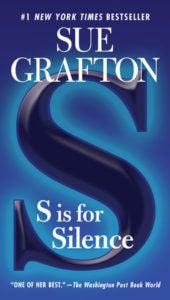 “In truth, it was a marriage made in heaven though the then agent could never have known that. In my youth, I loathed Nancy Drew and could not tolerate Agatha Christie. But here, in Kinsey, was my dream character: sharp, funny, vulnerable, and tough. And a little off the grid when it came to relationships thanks to an irregular childhood and an aunt who sort of raised her. This was a new kind of detective: a woman with quirks but also with a sense of herself, with empathy but also with street smarts. She opened a door for me and for thousands of women and, yes, men. It was a revelation how quickly men caught on to this oddball but terrific woman. She broke the gender barrier. There is a reason so many men and women named their daughters Kinsey over the years.
“Thank you Sue: You made a real difference in the lives of so many men and women even as you entertained us with so many wonderful and sometimes really scary books.
“In truth, it was a marriage made in heaven though the then agent could never have known that. In my youth, I loathed Nancy Drew and could not tolerate Agatha Christie. But here, in Kinsey, was my dream character: sharp, funny, vulnerable, and tough. And a little off the grid when it came to relationships thanks to an irregular childhood and an aunt who sort of raised her. This was a new kind of detective: a woman with quirks but also with a sense of herself, with empathy but also with street smarts. She opened a door for me and for thousands of women and, yes, men. It was a revelation how quickly men caught on to this oddball but terrific woman. She broke the gender barrier. There is a reason so many men and women named their daughters Kinsey over the years.
“Thank you Sue: You made a real difference in the lives of so many men and women even as you entertained us with so many wonderful and sometimes really scary books.
 “My good fortune increased by the time Sue was ready to take on the next letter. A Is for Alibi was selling like crazy, and Sue had gathered up her courage, left her agent, and took on Molly Friedrich, who has been with her—and me—since B Is for Burglar. I like to think we have made a really good team.
“Sue died this December. She had finished the letter Y in the series. There will never be a letter Z. Just as she did not want anyone tampering with her work and therefore forbade any movies made from her books, so she made it clear there would never be a ghost writer. So with Y Is for Yesterday, the alphabet ends. "
“My good fortune increased by the time Sue was ready to take on the next letter. A Is for Alibi was selling like crazy, and Sue had gathered up her courage, left her agent, and took on Molly Friedrich, who has been with her—and me—since B Is for Burglar. I like to think we have made a really good team.
“Sue died this December. She had finished the letter Y in the series. There will never be a letter Z. Just as she did not want anyone tampering with her work and therefore forbade any movies made from her books, so she made it clear there would never be a ghost writer. So with Y Is for Yesterday, the alphabet ends. " Putnam Acquires Dacre Stoker’s DRACUL Novel as Screen Rights Sold to Paramount
September 8, 2017
 Paramount Pictures has acquired the screen rights to the forthcoming Putnam novel DRACUL, a prequel to Bram Stoker’s classic Dracula. Andy Muschietti, whose highly-anticipated adaptation of Stephen King’s It opens in theaters this weekend, is attached to direct.
Paramount Pictures has acquired the screen rights to the forthcoming Putnam novel DRACUL, a prequel to Bram Stoker’s classic Dracula. Andy Muschietti, whose highly-anticipated adaptation of Stephen King’s It opens in theaters this weekend, is attached to direct.
 Dacre Stoker
Dacre StokerCredit: Todd Lisa Studio[/caption] Co-written by Bram Stoker’s great-grandnephew Dacre Stoker and author J.D. Barker, DRACUL is the first Dracula prequel to be authorized by the Stoker estate. The story, which is based on the missing, never-published first 100 pages of the original Dracula manuscript, centers around a 21-year-old Bram Stoker meeting an ungodly, evil being, who he traps in an ancient tower for the longest, most horrific night of his life. This evil being goes on to be the subject of Stoker’s iconic novel. News of Putnam Executive Editor Mark Tavani’s book acquisition and the Paramount Pictures deal was featured in multiple outlets this week, including Deadline, Variety, i09, AV Club, Publishers Weekly and Publishers Lunch. DRACUL is scheduled for publication by Putnam in Fall 2018.
What Debut Novelist Sophie Chen Keller Found
August 7, 2017
 At the heart of THE LUSTER OF LOST THINGS , the first novel by Putnam author Sophie Chen Keller, is Walter Lavender, Jr., silenced by a motor speech disorder but a master of finding, a son keeping vigil, twelve years and counting, for his lost father. When the book at the root of magic served up at the family bakery, The Lavenders, vanishes, Walter, accompanied by his overweight golden retriever, journeys through New York City to find it—along the way encountering an unforgettable cast of lost souls.
At the heart of THE LUSTER OF LOST THINGS , the first novel by Putnam author Sophie Chen Keller, is Walter Lavender, Jr., silenced by a motor speech disorder but a master of finding, a son keeping vigil, twelve years and counting, for his lost father. When the book at the root of magic served up at the family bakery, The Lavenders, vanishes, Walter, accompanied by his overweight golden retriever, journeys through New York City to find it—along the way encountering an unforgettable cast of lost souls. 
Popular Company News
PW’s Spring 2026 Writers to Watch Featuring PRH Authors
January 23, 2026
Publishers Weekly recently named several Penguin Random House authors to its Spring 2026 Writers to Watch list, recognizing a standout group of voices whose debuts are…
Streaming Now on Netflix: PEOPLE WE MEET ON VACATION, Emily Henry’s #1 Bestseller
January 16, 2026
Netflix’s film adaptation of the #1 New York Times bestseller PEOPLE WE MEET ON VACATION by Emily Henry (published by Berkley in 2021, with subsequent editions,…
NYT’s Most Anticipated Movie Adaptations: PEOPLE WE MEET ON VACATION and More!
January 9, 2026
Still deciding what to add to your TBR this year? The New York Times just rounded up a list of books to read before they hit…
Spotlighting Our 2026 ALA Adult Award Winners and Honorees
January 29, 2026
This week, the American Library Association kicked off the 2026 literary awards season with the announcement of their adult book awards, including the Andrew Carnegie Medals,…
Vonnegut Estate, Authors, and Student Plaintiffs Take Utah to Court Over the Freedom to Read
January 7, 2026
On Tuesday, January 6, the American Civil Liberties Union of Utah Foundation, Inc. (ACLU of Utah) filed the first major case defending the freedom to read…
RHCB Authors and Illustrators Receive Accolades from the ALA Youth Media Awards!
January 27, 2026
The American Library Association (ALA) announced the 2026 Youth Media Awards on Monday, January 26 at the Hilton Chicago Hotel, and several Random House Children’s Books…
WaterBrook Marks 30th Anniversary in 2026 with Yearlong Celebration
January 8, 2026
WaterBrook, the flagship imprint of Penguin Random House Christian Publishing Group, is celebrating its 30th anniversary in 2026 with a yearlong campaign highlighting the imprint’s history,…
2026 Book Cover Designers to Watch Featuring Two PRH Designers
January 16, 2026
We love seeing book cover design get its moment, especially when it comes to our designers! In a recent OurCulture article highlighting seven designers worth following…
Our Upcoming Author Events | January 5-9, 2026
January 5, 2026
The Penguin Random House Communications team invites you to discover some of the Penguin Random House Author Events we’re looking forward to this week! Every Monday, a curated selection of…
